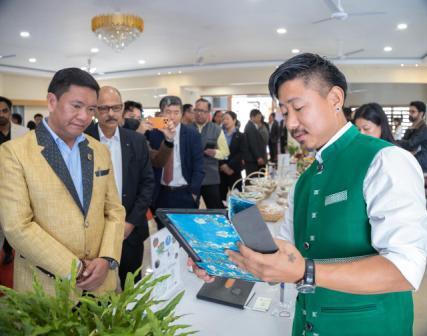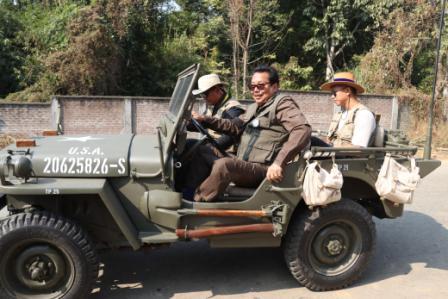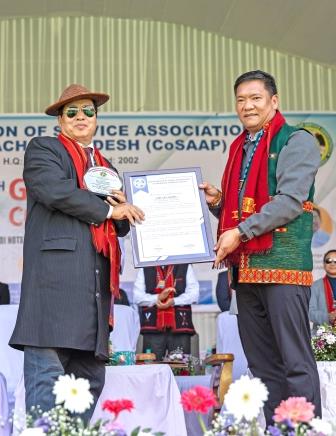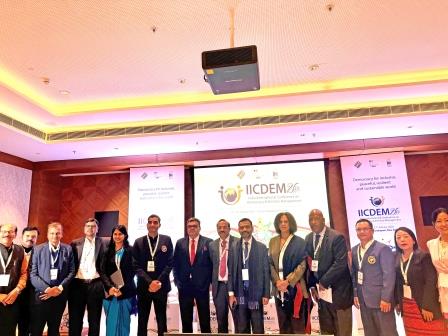-
 Startup success stories reflect potential of state’s youth: CM
Startup success stories reflect potential of state’s youth: CM
-
 Mein participates in vintage Willys Jeep Rally, inaugurates World War…
Mein participates in vintage Willys Jeep Rally, inaugurates World War…
-
DG Assam Rifles visits Khonsa Battalion
-
Governor advises DGP to take firm action on illegal migration
-
International white water kayaking to be held on the Tawang…
-
Raja convenes high-level meeting on effective traffic management
-
 NPS concerns genuine, needs careful consideration: CM Khandu
NPS concerns genuine, needs careful consideration: CM Khandu
-
Women-run kitchens showcase local cuisine
-
 Team Arunachal Pradesh participates in IICDEM 2026; leads thematic…
Team Arunachal Pradesh participates in IICDEM 2026; leads thematic…
-
24hr bandh hits normal life in Lower Subansiri
At a time when there is a general feeling that voice of the opposition is not being heard in the manner it should be in a democratic milieu, the decision of the Central government to totally delete the Question Hour and curtail Zero Hour in the upcoming monsoon session of the Parliament, expectedly, has triggered debate. Since the directive which came on Wednesday from the LS and RS Secretariat that the session that has already been curtailed due to Covid-19 pandemic will be bereft of these vital components, the opposition has expressed anguish and has termed it as an “ effort of trying to reduce Parliament to a notice board.” There is a certain element of truth in this claim as, in terms of past records, such instances are rare and have been seen only in extreme cases. Based on this comparison, there is no way thus the opposition can be blamed as the current situation, by any measurement, cannot be bracketed as an ‘extreme case’ and the growing perception that the ruling dispensation is using Covid as a plea in diluting the essential qualities of parliamentary democracy cannot be disregarded.
As per the directive, the delayed monsoon session scheduled to start on September 14 will have no Question Hour, Zero Hour will be cut short and there will be no opportunity for placing Private Members’ Bills also. Even if there is a general disenchantment regarding the whole move, a high level of angst has generated particularly over the full scrapping of the Question Hour. However hard it is being tried by the government to establish that the pandemic is a genuine reason for this extreme step, there will still be room to question its rationale. This is because, if the pandemic is accepted as the sole cause, then the entire monsoon session should have been suspended altogether and handpicking only the Question Hour carries little logic. It is an established fact that over more than 70 years of the history of Indian Parliament, the Question Hour of 60 minutes duration is the most energetic slot as it is here the MPs throw questions to ministers and hold them accountable for the functioning of their ministries. These vital questions have an overarching significance in terms of overall development in the country as the information gathered thereof that also eventually reach the public domain actually contribute a lot in ‘moving’ the concerned Ministries, thereby giving way to suitable actions or rectifications. It needs recalling that it was only during ‘extraordinary circumstances’ during 1962 Indo-China war and Emergency in 1975 such steps were taken. But it’s certainly not the case here.
The Ministry of Parliamentary Affairs must have a rethink of the decision. Question Hour must have a place in parliament's functioning, irrespective of the extremity of circumstances.

Kenter Joya Riba
(Managing Editor)She is a graduate in Science with post graduation in Sociology from University of Pune. She has been in the media industry for nearly a decade. Before turning to print business, she has been associated with radio and television.
Email: kenterjoyaz@easternsentinel.in / editoreasternsentinel@gmail.com
Phone: 0360-2212313

